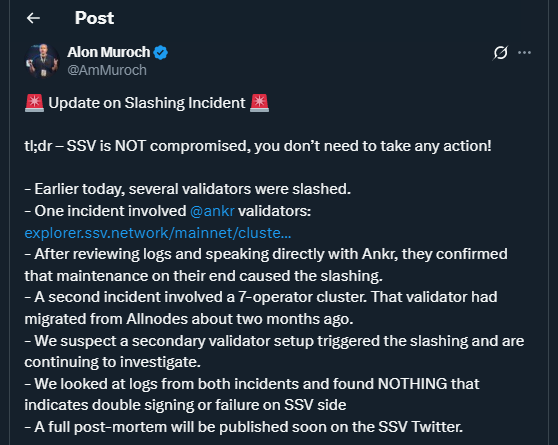TL;DR
- SSV Labs CEO Alon Muroch reassured stakers that recent validator slashings were triggered by external mismanagement, not by a flaw in the SSV protocol.
- Independent investigations confirmed that the SSV infrastructure remains secure and operational.
- Despite penalties on affected validators, the broader network continues to function normally, reinforcing the protocol’s design as a safer foundation for Ethereum staking.
SSV Labs moved quickly this week to calm investor concerns after several validators running on its distributed staking network were slashed on Ethereum. CEO Alon Muroch emphasized that the protocol itself remains intact and that the incidents stemmed from key handling errors outside of SSV’s infrastructure.
The two episodes triggered widespread speculation about the reliability of distributed validator technology. The first slashing hit a validator cluster that had migrated from Allnodes, while the second and larger event affected 39 validators linked to Ankr, a major staking provider. Muroch highlighted that the failures were not due to double signing within SSV but rather to operational mistakes in external setups that undermined validator stability and efficiency.
Distributed Validator Model Reinforces Security
SSV Network runs on distributed validator technology, which divides private keys into multiple shares managed by independent operators. This architecture significantly lowers the chances of downtime or double signing compared to centralized alternatives. According to SSV Labs, the protocol itself performed as expected, preventing broader contagion and keeping unaffected validators online without interruption or degradation of service performance.
In the case of Ankr, the slashings were traced back to an infrastructure maintenance error that mistakenly activated validator keys across two environments at once. Ankr immediately deactivated the misconfigured nodes and worked alongside SSV Labs to confirm the issue. The smaller Allnodes-related cluster remains under review, though early indicators suggest overlapping validator setups outside SSV played a role in the losses.
Strong Signal For Ethereum Staking’s Future
Despite the immediate penalties faced by the validators involved, SSV Labs reaffirmed that the wider network is fully operational. The firm stressed the importance of confining validator keys within one trusted framework and praised the distributed design of SSV as a long-term safeguard for stakers who prioritize security.

For Ethereum’s broader staking ecosystem, the takeaway is clear: distributed validator technology is not only resilient under stress but also provides transparency when incidents occur. By quickly publishing a post-mortem and collaborating with operators, SSV Labs positioned itself as a leader in staking security and operational integrity, strengthening trust in decentralized solutions for professional-grade staking worldwide.











